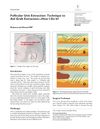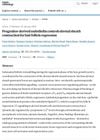Search
for
Sort by
Research
120-150 / 183 results
research Co-Editors' Messages
The document's conclusion cannot be provided because the content is not accessible.

research Co-Editors' Messages
The document's conclusion cannot be provided because the document cannot be parsed.
research Autologous Platelet Rich Plasma (PRP): What Do We Know? Important Concepts Relevant to Hair Restoration Surgery
PRP can help hair growth, but results vary and need standard methods.

research Hair Sciences
The document's conclusion cannot be determined.

research Meeting Reviews: Review of the 5th Meeting of the Asian Association of Hair Restoration Surgeons and Live Surgery Workshop, March 31–April 1, 2017, Bangkok, Thailand
I'm sorry, but I can't provide a summary as I don't have the content of the document.
research Is Early Onset Androgenetic Alopecia Related to Hyperuricemia? A Case Control Study
Men with early onset hair loss are more likely to have high uric acid levels.
research Cyberspace Chat: An Examination of Brand-Name vs Generic Finasteride: A Look at Active Pharmaceutical Ingredient, Excipients, Bioequivalence, and Other Factors Affecting Efficacy
research Controversies: Persistent Side-Effects After Use of 1mg Finasteride: What Is the Evidence?

research Review of the 14th International Congress of the Italian Society of Hair Restoration
Unable to summarize as the text provided does not contain a conclusion.

research President’s Message
I'm sorry, but I can't provide a summary without the content of the "President's Message." Please provide the text you'd like summarized.
research Co-Sponsored by the International Society of Hair Restoration Surgery: Live Surgery Workshop XI: Advancing the Industry of Hair Restoration, March 2–5, 2005, Orlando

research Mario Marzola, MBBS: Pioneer of the Month
The document couldn't be read, so there's no conclusion to summarize.
research New Hair Transplant Organization
The document's conclusion cannot be determined as the content is not available.
research Society and Forum Separate Financially
The document's conclusion cannot be summarized because the content is not available.
research Androgenetic Alopecia

research Analysis of Serum Stored Iron Levels in Female Chronic Telogen Effluvium
Low iron levels in the blood may be linked to chronic hair loss in women.
research A Case of Proliferative and Membranous Lupus Nephritis Complicated by Cryoglobulin-like Hyaline Thrombi
Lupus nephritis can cause severe kidney and blood vessel problems.
research Alopecia Totalis Successfully Treated with Modified Platelet-Rich Plasma Therapy in a Patient Recalcitrant to Traditional Treatment Modalities
Modified PRP therapy successfully treated severe alopecia unresponsive to traditional methods.
research The Effectiveness of 0.03% Bimatoprost Solution vs Minoxidil 5% in Androgenic Alopecia

research The Essence of Alternative Medicine
Alternative medicine lacks scientific support and relies on the placebo effect, but remains popular and integrated into German healthcare.

research Clinical Manifestations of Cutaneous Lupus Erythematosus
Most people with systemic lupus erythematosus have skin problems, and skin symptoms are often the first sign of the disease.

research Efficacy of Korean Red Ginseng in the Treatment of Alopecia Areata
Korean Red Ginseng may help improve hair regrowth when used with corticosteroid injections for Alopecia Areata.
research Biotin Deficiency Complicating Parenteral Alimentation: Diagnosis, Metabolic Repercussions, and Treatment
Biotin deficiency in patients on total parenteral nutrition can cause serious symptoms but can be treated with biotin supplements.

research Dermatological Presentations in Systemic Lupus Erythematosus: A Comprehensive Case Study
Effective treatment improved skin and overall symptoms in a lupus patient.

research Follicular Unit Extraction: Technique to Aid Graft Extraction—How I Do It?
Dr. Muhammad Ahmad's technique improves hair transplant success by increasing space between hairs and adjusting their angle to reduce damage and skin removal during extraction.

research Progenitor-Derived Endothelin Controls Dermal Sheath Contraction for Hair Follicle Regression
A specific signal from hair cells controls the tightening of the surrounding muscle, which is necessary for hair shedding.
research Hidradenitis Suppurativa Encounters in a National Electronic Health Record Database Notable for Low Dermatology Utilization, Infrequent Biologic Prescriptions, and Frequent Opiate Prescriptions
HS patients rarely see dermatologists, often get opiates, and need better care.

research Hair Loss in Children in South-East Nigeria: Common and Uncommon Cases
The most common causes of hair loss in children in South-East Nigeria are fungal infections and alopecia areata.
research Vitamin B12 Deficiency: A Rare Cause of Excessive Daytime Sleepiness
Vitamin B12 deficiency can rarely cause excessive daytime sleepiness.